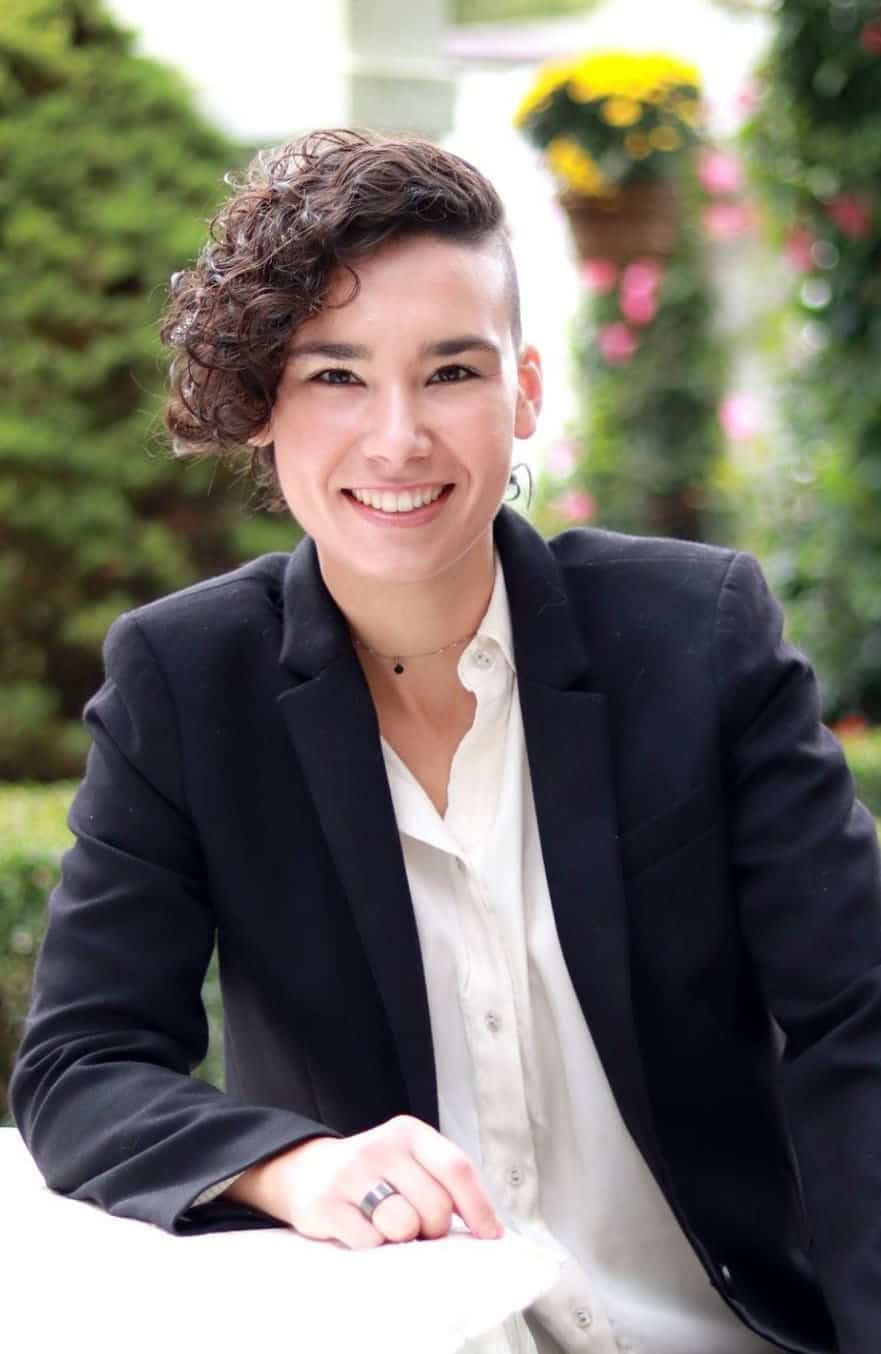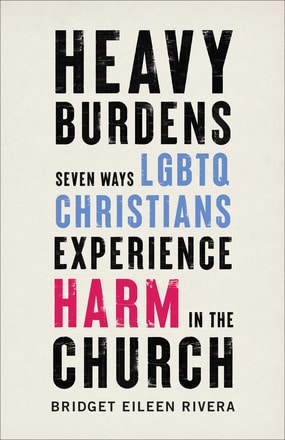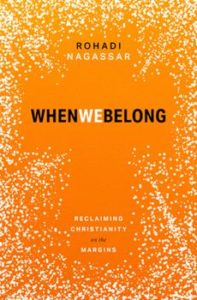We spoke with author-speaker Bridget Eileen Rivera about her new book, Heavy Burdens: Seven Ways LGBTQ Christians Experience Harm in the Church (Brazos Press). Rivera is a clear thinker, a scholarly but accessible writer, and a gentle but firm guide who invites us to imagine a world in which God’s LGBTQ+ children are given the space and safety they need to ask questions, seek God’s will for their lives, and flourish, no matter where the Spirit and their consciences lead them.
Below you’ll find our conversation, as well as an excerpt from Rivera’s book. (Check out Rivera’s book club discussions here.)

What made you want to write this book? What is your hope for it?
When I came out as gay, my social standing in the church completely changed overnight. I went from being the image of a faithful Christ-follower to being the subject of gossip, accusations of sin, and pastoral interventions for things like sitting next to my best friend at church too much.
The leadership of another church requested testimonies from congregants, so I volunteered, only to be told that I wouldn’t be allowed to share my testimony, given that I was an open lesbian.
As I got more involved in queer Christian communities, I witnessed numerous friends lose their jobs for being queer, receive anonymous death threats in the mail from church members, and lose every last one of their friends, among much much more. But when I tried to talk about how bad things were to cisgender, heterosexual Christians, many told me that I was exaggerating. I even had some tell me that I was being judgmental towards the church when I ought to be forgiving.
I realized that so many of these experiences of discrimination happened in the dark, where no one could see what was going on. So many queer Christians kept quiet about their experiences out of fear. I realized that I couldn’t let that be the case any longer. I wanted to help people understand what it’s really like to be queer in the church, even if I could only give them the smallest of glimpses. And I guess that’s how the idea for Heavy Burdens first started taking shape.
What does your book have to teach the church about other marginalized communities?
Discrimination against one group of people doesn’t happen in a vacuum. It originates within a framework for understanding the world that elevates a certain kind of person as the “right” way to be human and every other kind of person as “less than.” A multitude of demographics are therefore impacted by this arbitrary hierarchy and, as a result, many different types of people fail to “measure up.”
Homophobia is related to racism, for example, because heterosexuality demands a very white conception of masculinity, femininity, marriage, and family. Transphobia is related to ableism, in that anyone who relates to their body differently than the norm is believed to be “broken” in some way.
You did a lot of research to understand how the church has handled others kinds of differences/disagreements over the last two millennia. What is your biggest takeaway from church history for us today?
My biggest takeaway is that Christians have a long history of making huge deals out of very minor things, and we often don’t come to regret our behavior until much, much later. When you look back on church history and realize the types of things Christians would kill each other over, it really boggles the mind. The wars of religion from the 16th-18th centuries are just filled to the brim with horrific stories of bloody disputes, rivalries, executions, and massacres over religious differences that few Christians even think about anymore, like the proper structure for church governance (yes, Christians killed each other over this debate).
It’s important to take a step back and ask ourselves whether this argument actually implicates the gospel in any kind of essential way. Is it really a matter of primary significance, or have we fallen prey to the cultural moment, convincing ourselves to place more stock in an issue than it’s actually worth?
Today, many Christians love to criticize contemporary culture for its obsession with sex, but how much of the church’s own fixation on marriage is actually a product of the same cultural obsession? I can’t answer that question in this interview, but I think it’s a question worth asking.
What is the first, most fundamental thing you would like to see shift in the Body of Christ today? In other words, what would begin to turn this ship around, even if incrementally, so that the church moves in the direction of flourishing for all, regardless of sexual orientation, gender identity, race, and physical/cognitive abilities, etc?
It’s hard to say what should come first or what is most fundamental. At the very least, I’d like to see the church become more introspective about itself, more willing to examine its own sins instead of pointing out the sins of others. Far too many people are hurting right now because of experiences they had in churches, in ministries, with pastors, with Christian friends, at seminaries, at Christian schools and colleges—the list is endless. For these wounds to heal, churches need to repent and do better, and to truly repent, churches need to first understand people’s hurt and pain. That means listening and seeking to learn and ultimately taking a back seat in many of these conversations. For many Christians, this doesn’t come naturally, but this is also why it’s so important.

Excerpt: “The Church: Storm or Shelter?”
By Bridget Eileen Rivera
For they preach, but do not practice. They tie up heavy burdens, hard to bear, and lay them on people’s shoulders, but they themselves are not willing to move them with their finger. (Matthew 23:3–4)
Imagine walking with Christian in John Bunyan’s The Pilgrim’s Progress. You arrive at the cross, and Christian’s burden slips from his back. But just as he’s about to rejoice, a stranger suddenly appears with an even greater burden. He hoists it upon Christian’s shoulders, replacing what Christ had taken away, and declares that Christian must journey all the way to the Celestial City like that. How far would Christian get?
Countless LGBTQ believers find themselves struggling under the weight of burdens that no Christian should ever bear, burdens given to them not by Christ but by stigma, prejudice, and discrimination. They faithfully persevere in their journey to the Celestial City with a heroic degree of faithfulness, but they do so under the mounting pressure of an atmosphere hostile to their faith. What’s worse, many sexual and gender minorities leave the faith altogether, their belief destroyed in the wake of abhorrent abuses that would test the resolve of the greatest of saints. Few Christians understand the extent of the problem, and even fewer are ready to acknowledge that Christian communities are responsible.
Indeed, discrimination against LGBTQ people exists at virtually every level of church involvement, from how sexual and gender minorities experience evangelism, to how they experience discipleship, community, accountability, ministry opportunities, counseling, mentorship, family, and friendship. More than one queer believer has told me that merely stepping over the threshold of a church causes their entire body to stiffen with fear. Others tell me that they no longer attend church at all because they’ve been rejected so many times; they can’t bear to be rejected again.
Discrimination against LGBTQ people exists at virtually every level of church involvement.
It’s a tragedy experienced by millions of LGBTQ people who grew up in the church, have attempted to join the church, or have encountered the church in some way during their lifetime. A tragedy measured in the silent tears they shed and ultimately counted in the bodies of the many LGBTQ people who die by suicide every year.
Lesbian, gay, and bisexual youth contemplate suicide three times more often than heterosexual youth and are 8.4 times more likely to attempt suicide if they experience family rejection. Forty percent of transgender adults have attempted suicide at least once in their lifetime, and of that number, 92 per- cent attempted suicide before the age of 25. Of all teen suicides from 2013 to 2015, nearly 25 percent were LGBTQ. Of all homeless youth in the United States, 40 percent are LGBTQ. In the span of a year, an estimated 1.8 million LGBTQ youth between the ages of 13 and 24 will seriously contemplate suicide. LGBTQ people are also more likely to be the target of hate crimes than any other minority group in the United States today, surpassing Jewish, Muslim, and Black people.
For most people, religious involvement reduces the risk of suicide. But when gay and lesbian college students engage more heavily in their faith communities, their risk of suicide only goes up. Gay and lesbian students are 38 percent more likely to contemplate suicide if they are heavily involved in faith communities. Lesbian students, counted separately from gay male students, are 52 percent more likely to contemplate suicide if they are heavily involved in faith communities. How can that be? How is it that going to church would be a factor in keeping straight people alive but pushing gay people toward death?
How is it that going to church would be a factor in keeping straight people alive but pushing gay people toward death?
The discrimination facing LGBTQ people in the church is no secret. The vast majority of non-Christians in the United States (as much as 91 percent) believe Christians to be homophobic. Consider these observations from two leading researchers who are Christians themselves: “Outsiders say our hostility toward gays—not just opposition to homosexual politics and behaviors but disdain for gay individuals—has become virtually synonymous with the Christian faith. . . . When you introduce yourself as a Christian to a friend, neighbor, or business associate who is an outsider, you might as well have it tattooed on your arm: anti-homosexual, gay-hater, homophobic. I doubt you think of yourself in these terms, but that’s what outsiders think of you.”
A better church
A queer friend of mine once likened her experience in the church to standing in a field in a thunderstorm. Every drop of rain is a new slight, another put-down, another reminder that you’re the wrong kind of person. Talking about it can feel like trying to talk about the wetness of a single drop of rain. What’s the big deal? people say. But it’s not a particular raindrop that causes the problem. The problem is the storm.
Tragically, many LGBTQ Christians find their church to be the source of the storm when it ought to be the shelter. They first experience marginalization in the context of church, they find Christians to be the most common perpetrators of prejudice against them, and they learn to avoid everything to do with Christianity as a means of sheer survival.
It should not be this way.
I myself am a lesbian who follows what’s known as the “traditional” sexual ethic. This means that I’ve chosen celibacy as a vocation instead of marriage, and that I’m invested in discovering pathways within celibacy that are healthy and life-giving. However, if I’ve found one thing to be true when it comes to LGBTQ issues in the church, it’s that many of us get so caught up on gay marriage that we forget there’s more at stake.
Countless LGBTQ people grow up in churches believing that God hates them—the climax to a story that we’ve told ourselves about sex and gender that elevates cisgender heterosexuality as the only valid human experience and that labels all other experiences sinful. Let’s unpack that story together.
The people of God represent the hands and feet of Christ to a broken world, bringing God’s healing touch to you and to me and to every person we meet. As the body of Christ, we incarnate the goodness of the gospel. We represent a life-giving Savior who doesn’t rest with 99 sheep out of 100. He goes out, and he searches, and he rescues, saving the smallest and most insignificant member of his flock. He isn’t happy with saving “most” of the flock. He works until every last one of his sheep experiences the love and care and mercy of his fold (Matt. 18:10–14).
The heart of Jesus breaks with every broken heart, and he mourns the mistreatment of every vulnerable soul. A day will come when he will look upon each of us, and he won’t ask us about our 99 friends. He’ll ask us about the one, and he’ll want to know how we treated the one; and on that day, he will declare, “As you did it to one of the least of these my brothers, you did it to me” (Matt. 25:40).
Content taken from the introduction of Heavy Burdens by Bridget Eileen Rivera, ©2021. Used by permission of Baker Publishing.
Bridget Eileen Rivera writes and speaks on faith, sexuality, and justice. Her website, Meditations of a Traveling Nun, is a leading resource on gay celibacy. She has worked with a number of faith-based organizations, including Revoice, Christians for Social Action, and Preston Sprinkle’s Center for Faith, Sexuality & Gender. Rivera is currently pursuing her PhD in sociology from the City University of New York Graduate Center. You can follow her on social media at @travelingnun.


